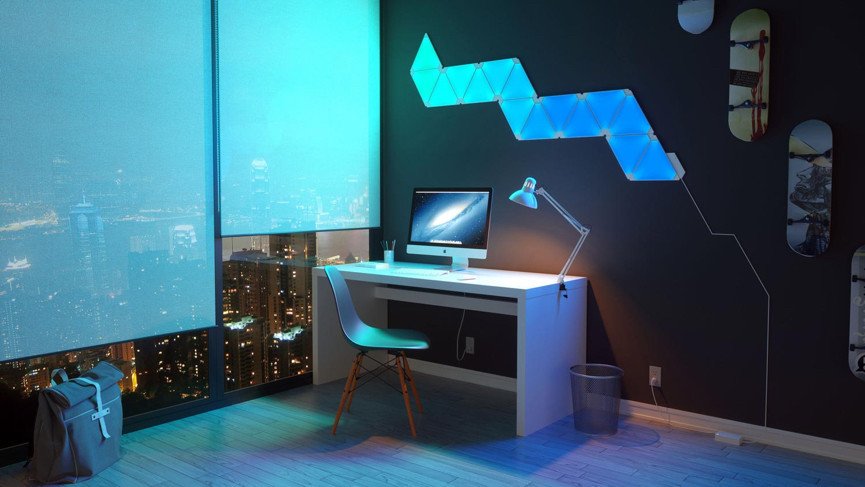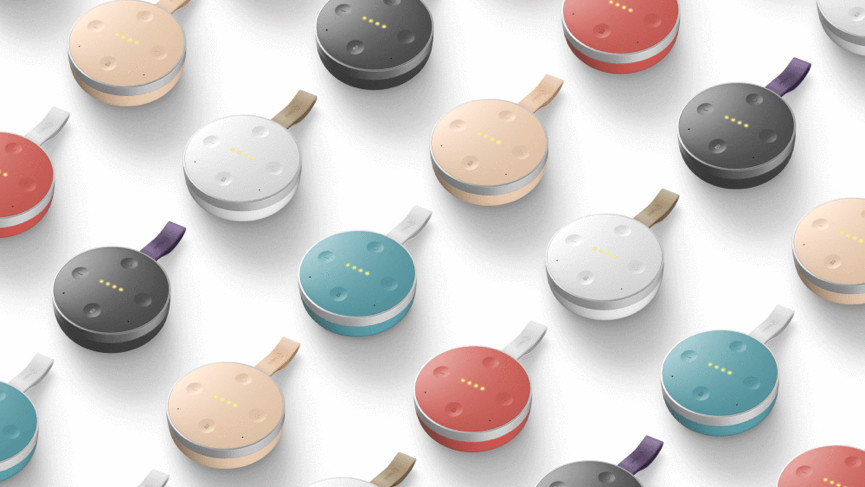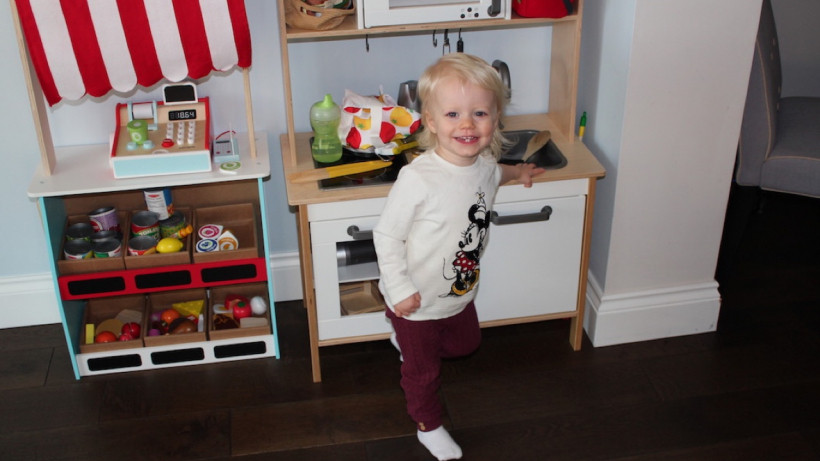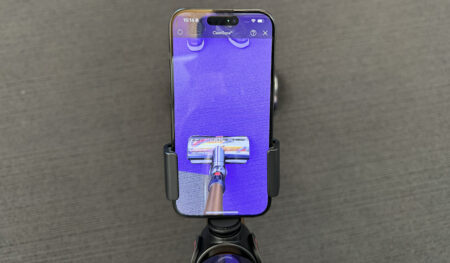And Google is a slightly less powerful girl
Maia started saying “Alexa” when she was around a year old. Maybe that’s a baby milestone now: drinking from a cup, imitating others, commanding AI robots.
Her relationship with Amazon’s voice assistant actually began earlier even than that. When she was around six months (development stage: turning towards sounds and voices) she started to swivel round in her high chair whenever Alexa, via the Echo Dot on our kitchen cupboard, talked back to me over breakfast.
Fast forward to a year and Maia had learned my “Alexa, what’s the headlines” morning routine so, that on a couple of days when I’d forgotten to do it, she shouted “Alexa!” Next came “Alexa, on” and “Alexa, off”; then “Alexa, lights off” and now she can go into the front room to play with her box of toys, see that it’s dark and say “Alexa, turn big living room light on”.
Read this: Smart home ecosystems – everything you need to know
Okay, okay, Alexa can’t understand her mushed up toddler language just yet, but I reckon she’s six months away from being able to fully control the house.
Alexa noooo
Maia’s quite advanced in speaking for her age, as you might have guessed, but Alexa was within her first 50 words, without a doubt.
She definitely thinks Alexa is some sort of person. She thinks Alexa can help her. Our Dyson robot vac will sometimes charge itself then start up again to complete a cycle. So we’ll just be sitting there and it will come out of its dock. She’ll go: “Noooo, Alexa, stop it, stop it.” You actually can control it via Alexa, I just haven’t set it up yet so weirdly she’s living in the future.
I reckon she’s six months away from being able to control the house
It’s all tech related stuff, though, and I have a lot of tech in my house. For instance, Maia wouldn’t call for Alexa if she had a problem with her food but when the Nest Protect is set off by the steam in the bathroom, again it’s “Alarm, alarm, Alexa noooo.” She thinks Alexa has more power than it actually does.
I’ll admit that might be because my wife Eloise and I sometimes pretend Maia is controlling the lights when it’s really us on our phones. She comes into my office and shouts “Alexa, blue” and “Alexa, green” at my Nanoleaf – I’ll be quickly changing it on the app because really the command is “Alexa, set the Nanoleaf to [name of scene]”. But she thinks it’s incredible that you can change the colours. And she’s not wrong.

The way she talks to tech is way more intuitive than the commands we’re used to. What she’s saying is what these products should understand if, for instance, they could both locate you precisely inside the house and recognise your voice. Our house alarm plays a little tune for 30 seconds when we arrive home and Maia just says “Alexa, alarm off, alarm off.” (Which doesn’t work).
Hey Google, Jingle Bells
We have two Echo Dots in the house – one in the kitchen and one on the upstairs landing – as well as an Echo Show in my office in the garden. But we actually also have a Google Assistant powered bathroom speaker too – for songs at bath time.
At first Maia thought Alexa was omnipresent but now she’s beginning to understand that it’s built into a device and so is Google. When I ask her where Google lives, she will say “bathroom!” and for Alexa, she says “downstairs!” She still thinks they’re people though, compared to her vTech toys or Peppa Pig flip phone which make noises but are ultimately pretend.
As her new hobby is labelling things girls or boys, I asked her if Alexa is a girl or a boy – our Echo is set to a female voice – and she said, quite emphatically “Boy!” Google? A girl apparently. Though quite a few of her teddy bears that you’d have thought would be boys, are girls according to Maia, including Tony the Tiger.
The good thing about Maia thinking Alexa and Google are people is that when I leave the bathroom speaker on overnight and the battery runs down, I can say “Google’s already gone to sleep” and she’ll reply, “Oh, Google’s tired.”

Google Assistant can actually understand her more by default of Google being an easier word for a baby. Alexa is a hard word to say for someone who’s not got many teeth. Over Christmas Maia could say “Hey Google, Jingle Bells,” but the speaker then reads out facts about the song. If she added in a “play”, she’d be away. But this is another way voice assistants need to get smarter – chances are if you say the name of a song, you want to listen to it, not learn about its popularity in December. (Incidentally, Maia can now belt out the start of Auld Lang Syne because for a year, when we said “Alexa, sing a song” this is was the song of choice.)
Alexa is a hard word to say for someone who’s not got many teeth
Recently, we were in the car with Google Maps on and while we usually have it on silent, this time the volume was up so Voice was on. Her face = mind blown. I haven’t told her yet that the Google in the bathroom and the Google that plays animal noises on my computer are the same. So that might blow her mind some more.
Having co-founded a smart home site, there’s a strong chance I’ll end up with something Siri or Cortana powered in my house soon enough but that shouldn’t be a problem. I’m platform agnostic and so is Maia.
Baby talk
When your toddler is chatting to the AI embodiment of a global tech corporation, there are considerations. I have pre-emptively turned off all the shopping commands. She’s constantly talking to Alexa so if shopping was turned on, there’s a chance she’d be buying stuff. Then there’s the fact that if you look at my Alexa history on any given day, you’ll see “Alexa, thank you” ten times. That’s Eloise trying to get Maia to say please and thank you to Alexa. It’s mixed messages – we tell her to say please and thank you to everyone then we boss Alexa around.
Overall, though, I think our parents’ generation were very anti-tech, scared of the internet but because we’ve always had it, we accept our kids are going to have it. It’s much too early to say but the potential positives are also intriguing – will it cut down on her screen time, for instance?
I use Alexa every day and I have done for a year but I still don’t feel 100% normal saying “Alexa turn the lights off”. Me and my wife agree: you don’t really talk to it normally, you do this sort of bold voice. But I think someone like Maia who has always had voice assistants that (she thinks) understand her, never having encountered crappy Nuance voice software circa 2012, it will just be so natural for her, it won’t be conscious at all.
I know we’re seeing new smart speakers every month now but Alexa itself is still first-gen tech. When we get to version two or three, it will get much cleverer and just think how familiar she’ll be with it by then. In a way Alexa will grow up as Maia grows up. By the time she’s four or five, they’ll be having full blown conversations.





